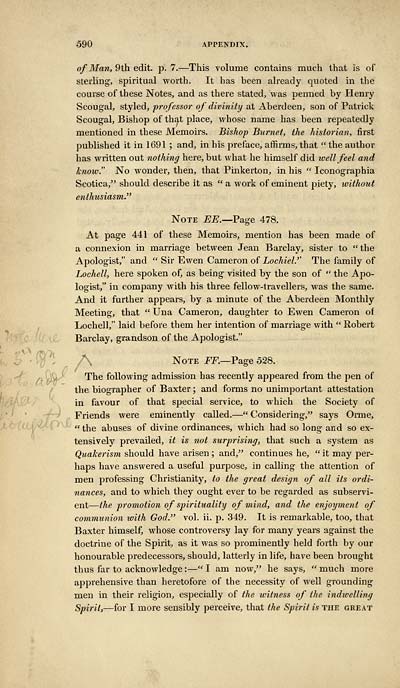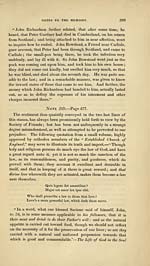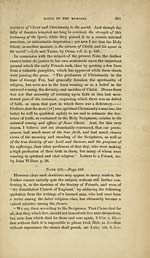Diary of Alexander Jaffray, provost of Aberdeen
(630) Page 590
Download files
Complete book:
Individual page:
Thumbnail gallery: Grid view | List view

590 APPENDIX,
o/ Maw, 9th edit. p. 7. — This volume contains much that is of
sterling, spiritual worth. It has been already quoted in the
course of these Notes, and as there stated, was penned by Henry
Scougal, styled, professor of divinity at Aberdeen, son of Patrick
Scougal, Bishop of thi^t place, whose name has been repeatedly
mentioned in these Memoirs. Bishop Burnet, the historian, first
published it in 1691 ; and, in his preface, affirms, that " the author
has written out nothing here, but what he himself did well feel and
know." No wonder, then, that Pinkerton, in his " Iconographia
Scotica,^' should describe it as "a work of eminent piety, without
enthusiasm."
Note EE. — Page 478.
At page 441 of these Memoirs, mention has been made of
a connexion in marriage between Jean Barclay, sister to "the
Apologist," and " Sir Ewen Cameron of Lochiel.'' The family of
Lochell, here spoken of, as being visited by the son of " the Apo-
logist," in company with his three fellow-travellers, was the same.
And it further appears, by a minute of the Aberdeen Monthly
Meeting, that " Una Cameron, daughter to Ewen Cameron of
Lochell," laid before them her intention of marriage with " Robert
'. -.K, Barclay, grandson of the Apologist."
• ^f^- A Note FF.— Page 528.
, \\rj y The following admission has recently appeared from the pen of
the biographer of Baxter ; and forms no unimportant attestation
in favour of that special service, to which the Society of
Friends were eminently called. — " Considering," says Orme,
" the abuses of divine ordinances, which had so long and so ex-
tensively prevailed, it is not surprising, that such a system as
Quakerism should have arisen ; and," continues he, " it may per-
haps have answered a useful purpose, in calling the attention of
men professing Christianity, to the great design of all its ordi-
nances, and to which they ought ever to be regarded as subservi-
ent — the promotion of spirituality of mind, and the enjoyment of
communion with God." vol. ii. p. 349. It is remarkable, too, that
Baxter himself, whose controversy lay for many years against the
doctrine of the Spirit, as it was so prominently held forth by our
honourable predecessors, should, latterly in life, have been brought
thus far to acknowledge : — " I am now," he says, " much more
apprehensive than heretofore of the necessity of well grounding
men in their religion, especially of the witness of the indwelling
Spirit, — for I more sensibly perceive, that the Spirit is the great
o/ Maw, 9th edit. p. 7. — This volume contains much that is of
sterling, spiritual worth. It has been already quoted in the
course of these Notes, and as there stated, was penned by Henry
Scougal, styled, professor of divinity at Aberdeen, son of Patrick
Scougal, Bishop of thi^t place, whose name has been repeatedly
mentioned in these Memoirs. Bishop Burnet, the historian, first
published it in 1691 ; and, in his preface, affirms, that " the author
has written out nothing here, but what he himself did well feel and
know." No wonder, then, that Pinkerton, in his " Iconographia
Scotica,^' should describe it as "a work of eminent piety, without
enthusiasm."
Note EE. — Page 478.
At page 441 of these Memoirs, mention has been made of
a connexion in marriage between Jean Barclay, sister to "the
Apologist," and " Sir Ewen Cameron of Lochiel.'' The family of
Lochell, here spoken of, as being visited by the son of " the Apo-
logist," in company with his three fellow-travellers, was the same.
And it further appears, by a minute of the Aberdeen Monthly
Meeting, that " Una Cameron, daughter to Ewen Cameron of
Lochell," laid before them her intention of marriage with " Robert
'. -.K, Barclay, grandson of the Apologist."
• ^f^- A Note FF.— Page 528.
, \\rj y The following admission has recently appeared from the pen of
the biographer of Baxter ; and forms no unimportant attestation
in favour of that special service, to which the Society of
Friends were eminently called. — " Considering," says Orme,
" the abuses of divine ordinances, which had so long and so ex-
tensively prevailed, it is not surprising, that such a system as
Quakerism should have arisen ; and," continues he, " it may per-
haps have answered a useful purpose, in calling the attention of
men professing Christianity, to the great design of all its ordi-
nances, and to which they ought ever to be regarded as subservi-
ent — the promotion of spirituality of mind, and the enjoyment of
communion with God." vol. ii. p. 349. It is remarkable, too, that
Baxter himself, whose controversy lay for many years against the
doctrine of the Spirit, as it was so prominently held forth by our
honourable predecessors, should, latterly in life, have been brought
thus far to acknowledge : — " I am now," he says, " much more
apprehensive than heretofore of the necessity of well grounding
men in their religion, especially of the witness of the indwelling
Spirit, — for I more sensibly perceive, that the Spirit is the great
Set display mode to:
![]() Universal Viewer |
Universal Viewer | ![]() Mirador |
Large image | Transcription
Mirador |
Large image | Transcription
Images and transcriptions on this page, including medium image downloads, may be used under the Creative Commons Attribution 4.0 International Licence unless otherwise stated. ![]()
| Histories of Scottish families > Diary of Alexander Jaffray, provost of Aberdeen > (630) Page 590 |
|---|
| Permanent URL | https://digital.nls.uk/94786771 |
|---|
| Description | A selection of almost 400 printed items relating to the history of Scottish families, mostly dating from the 19th and early 20th centuries. Includes memoirs, genealogies and clan histories, with a few produced by emigrant families. The earliest family history goes back to AD 916. |
|---|

